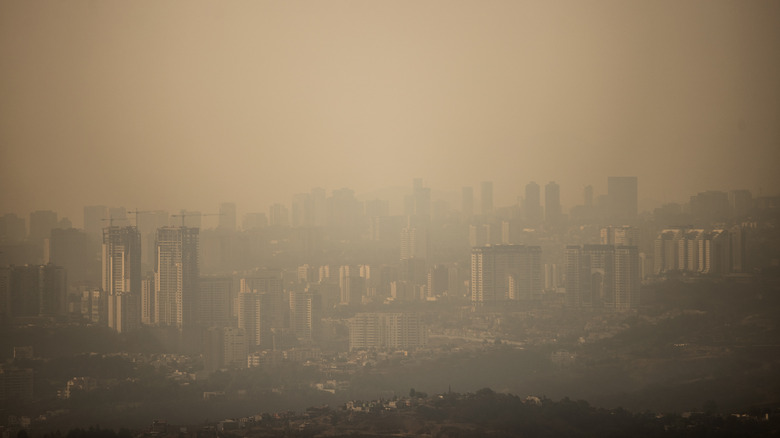Do This If You Want To Improve Your Breathing
Our lungs need to be healthy for our respiratory system to function effectively. Inflated or constricted lungs can cause difficulty in breathing, which can even prove fatal in extreme cases (via Medline Plus). And this is something to think about, as your lifestyle may be damaging your respiratory system without you realizing it. So if you want to improve your breathing, one of the first steps is to identify what can cause a problem.
Let's start with cigarettes. We have all heard that smoking is bad for the lungs, but how bad is it, really? According to the Lung Health Institute, smoking is responsible for up to 90% of all forms of lung cancer, plus over a quarter of deaths from both cancer and heart disease. And even when it does not lead to lung cancer, it can cause chronic breathing problems such as asthma and bronchitis (infection of the bronchi).
Then there's drinking. One study cited by the Lung Health Institute revealed that alcohol may worsen chronic obstructive pulmonary disease (COPD). It is also reported that women who drink two or more drinks each day and men who have three or more per day are more likely to have liver and mouth cancer, hypertension, depression, and liver damage.
Notice the effect of your environment on your breathing
Excessive vehicular emissions, waste gases, chemical emissions, fumes, and other industrial byproducts impact the environment and, consequently, on our respiratory system. Atmospheric pollution may result in throat irritation, eye irritation, coughing, wheezing, chest heaviness, and excessive sputum production. Some people may also develop breathing disorders like bronchitis or asthma, one study showed.
Another common environmental factor that results in breathing problems is Sick Building Syndrome, characterized by dizziness, irritation of the mucus membranes, uneasiness, and restlessness, a study in the Indian Journal of Occupational and Environmental Medicine showed. Sick Building Syndrome is common in crowded spaces like multi-story houses or congested apartments because houses in such proximity have poor ventilation and have stale air circulating throughout them. The carbon dioxide exhaled through the lungs also lingers around in such spaces, harming human health. Viral diseases also spread more quickly in enclosed areas like these.
"Unvented gas stoves and ranges raise the risks of CO and combustion byproducts," the University of Rochester Medical Center cautioned. "Clean and adjust burners, and use exhaust fans. Never use a stove or range to heat a home."
This can help you improve your breathing
As smoking is a major threat to lung health, quitting is imperative. Although difficult to do, quitting smoking works almost instantly; within a month, the brain's nicotine receptors return to normal (via National Institute on Drug Abuse).
Physical activity and exercise can be a great way to improve breathing and respiratory health. When a person is physically active, the heart and lungs work harder to provide extra oxygen to the muscles, resulting in better respiratory health (via American Lung Association). Both aerobic and muscle-building activities can improve lung health.
When your breathing is affected by pollutants, you'll want to try to reduce your exposure to them (per EPA). Other lifestyle changes that can help improve breathing include a better posture. Ensure that your posture allows you to have enough room for your lungs to function freely. Staying hydrated is also very important for your respiratory health as it is for the rest of your body (via Rush). You can also join a support group if you have a respiratory or breathing condition. These groups can help you improve your breathing techniques and keep you informed about your health.



